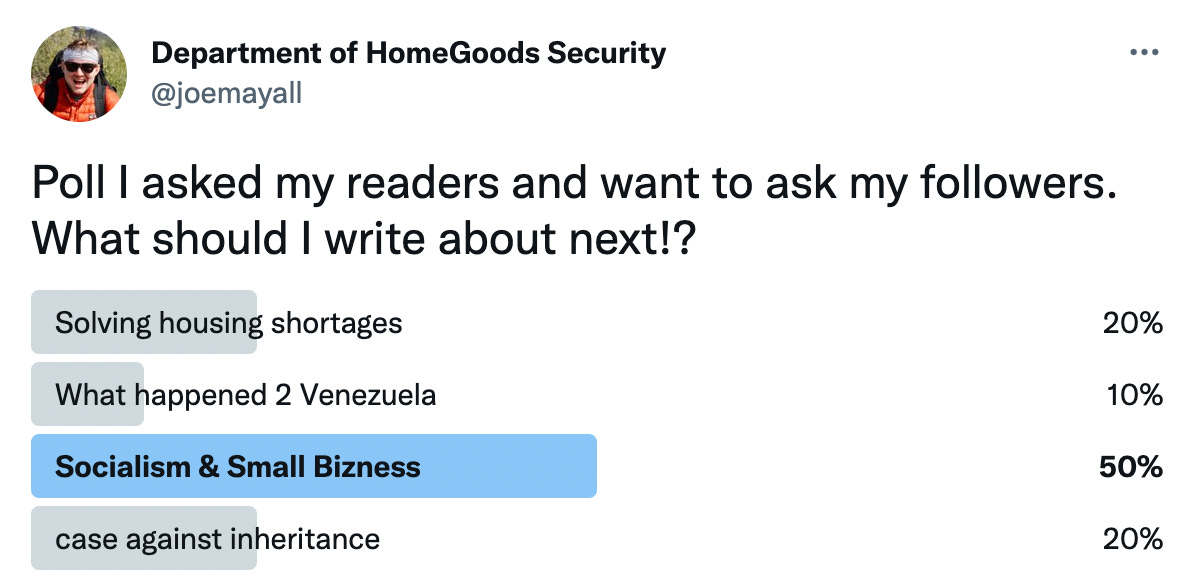Welcome to JoeWrote! If you enjoy my work, please consider supporting me in one of two ways:
Becoming a paid subscriber,
Or, if financial support isn’t an option for you, please share on social media to help JoeWrote grow.
Enjoy! - Joe

To the uninitiated, the case for Socialism is best-received when discussing highly profitable, international corporations. To convince an audience of the need to shift power and wealth from billionaire owners to workers, one merely has to contrast Jeff Bezos’s space adventures with the practice of Amazon warehouse workers pissing in empty soda bottles to make quota. But while few quarrel with redistributing the wealth of the 1%, the Socialist argument stumbles when discussing small businesses.
A fan favorite of the American image, small businesses manifest the “pull yourself up by your bootstraps” mentality of The American Dream. Politicians love them, often accusing opponents of “focusing on Wall Street and forgetting about Main Street.”
This notion of small businesses being birthed from perseverance and hard work isn’t entirely contrived. While the negatives of small businesses (harder to unionize, less room for employee development, and less efficient than big businesses) are under-discussed, most American you stop on the street could tell you about an acquaintance who rolled up their sleeves and started their own bakery, sports store, or pizza parlor. They’ll likely speak fondly of these petite bourgeois (small business owners), praising their long nights and hard work to build something of nothing. And they’ll likely be dismissive of any notion that this proprietor is exploiting their workers.
So, what does Socialism want to do about these small businesses?
Just as we aim to do with industrial titans such as Walmart and Amazon, Socialists don’t seek to destroy businesses. Instead, we seek to improve them by ensuring the “fruits of the labor” (profits) are proportionally distributed to those who created those profits.
The Murky Role of the Owner
The principal reason “the small business question” gives pause to those considering support for the Socialist cause is the convoluted role small business owner(s) play in the “worker or owner” dichotomy.
In large-scale enterprise (which comprise the bulk of the American economy), the owner seldom works, and they never contribute enough to justify their exorbitant income. Elon Musk takes home over 40,668 times the median income of Tesla employees. Even if Musk stopped partying with sex traffickers and began working 24/7/365, there’s no reality in which his labor is forty thousand times more productive or valuable than the median worker’s contribution.
But in the Mom & Pop shops habituating your neighborhood, it’s likely the owner is hard at work behind the counter, stocking the shelves, or scrubbing the pizza oven. This is where the line between owner and worker blurs. When it comes to small businesses, owners typically double as a worker, in some cases far more than the average shift employee. To get a business off the ground, the owner-worker likely had to pull late nights, refine products and procedures, and risk their family’s financial stability to bring the business to life.
In cases such as these, the owner-worker should be compensated more than other workers, as they are contributing more labor.
Remember, Socialism aims to give the worker the full fruit of their labor. Those who work more, get more. But even then, exhaustive hours should not be a requirement for one to live a life of luxury free from the pains of want and hardship.
What would Socialist small businesses look like?
I’ll remind you, “Socialism” is a concept, as varying in definition as “love” or “Christianity,” so definitions differ from one person to person. But what I can illustrate is the model most accessibly to the proletariat (working class), the worker co-operative.
Take Tim, for example. A year ago, Tim opened a pizza shop. After twelve months of long workdays, lackluster sales, and financial insecurity, Tim has enough revenue to hire two employees to help scale his business. Becky will work as the cashier while Ryan kneads dough.
With a worker co-operative model, all three of the workers would have equal say in the direction of the company and equal claim to the profits, if their effort is equal. This is compared to a Capitalist model where Becky and Ryan collect a stagnant wage while Tim takes home the surplus value the three of them created on any given night.
Now, if Becky and Ryan were only part-time workers who covered the Friday and Saturday night rush, then it would not be equitable for them to take profit from the work Tim did Sunday through Thursday. In that case, a proportionate payment structure would need to be devised that fairly rewarded all, which extends beyond this example.
A Common Question: Aren’t profits a reward for the owner-worker’s risk?
Imagine someone saved you from drowning. You’d surely want to repay them with fielty, praise, and perhaps even some money. But, if twenty years passed, and they’re still asking you to send weekly checks for a good deed two decades old, you’d rightly begin to question how long you’re in their debt.
The same can be said of businesses. Just because Jeff Bezos worked long nights shipping books for his online bookseller in 1994 doesn’t mean he has a moral claim to the value created by workers in a warehouse he’s never set foot in.

At the end of the day, labor is what creates value. Without it, Amazon warehouses are nothing more than dust factories, and Tim’s Pizza Shop is limited to the few pizzas its owner-worker can make.
“Capital is only the fruit of labor, and could never have existed if labor had not first existed. Labor is the superior of capital, and deserves much the higher consideration.” - Abraham Lincoln, Presidental Annual Message, 1861
This is just one possibility for Socialist small businesses. Like any aspect of Socialism, the framework may change, but the principle underlying it — the right to the value created by one’s labor — is eternal.
This piece touched on many concepts that I didn’t have time to delve into. Please use the comments to ask any questions or let me know what you think about Socialist small businesses. And don’t forget to subscribe!
Weekly Roundup
Crime & Punishment: Why the Poor Stay Poor in America examined why poor Americans and minorities are disproportionately involved in car crashes.
The Intercept published an excellent piece on the origin of student debt. (Spoilers: it’s Reagan’s fault.)
I wrote this article after polling my Twitter followers for what they’d like to read next. Follow me on Twitter to vote for future topics.
Game of Thrones is back! Well, I guess it’s technically House of the Dragon, but you get the point. If you’re like me and obsessive with your shows, I recommend Bald Move’s companion podcast.







Bezo’s comment that we all paid for it enraged the left the same way Obama’s “you didn’t build that” comment did the right.
The fact is both are true, and part of the outrage is down to the fact that on some level people knew it.
People can make dick jokes about Bezos’ rocket all they want; the price of admission is reconciling that with the fact that they have a Prime account.
Same story with Obama. As you note, we’ve lionized the idea of the small business owner. But no man is an island. We collectively paid for the education they (and their employees received), we paid for the roads used by customers and suppliers alike, and more.
It is very important for people to understand that entrepreneurship, innovation, and invention do not belong to capitalism. Nor, do they particularly thrive there.
To me, the issue is not what happens to profit in a socialist system but the fact that all manner of valuable and dignified labor can be undertaken without the goal of profiteering. By far and awayv most small businesses owners are not trying to profit. They are trying to generate a comfortable, diginified, and sustainable livelihood for themselves and, if they are decent, for their employees as well.
Socialism doesn't mean that people can't own or direct their own businesses. It means that that the structural incentives are designed to support enterprise that serves our shared common good rather than private profiteering.